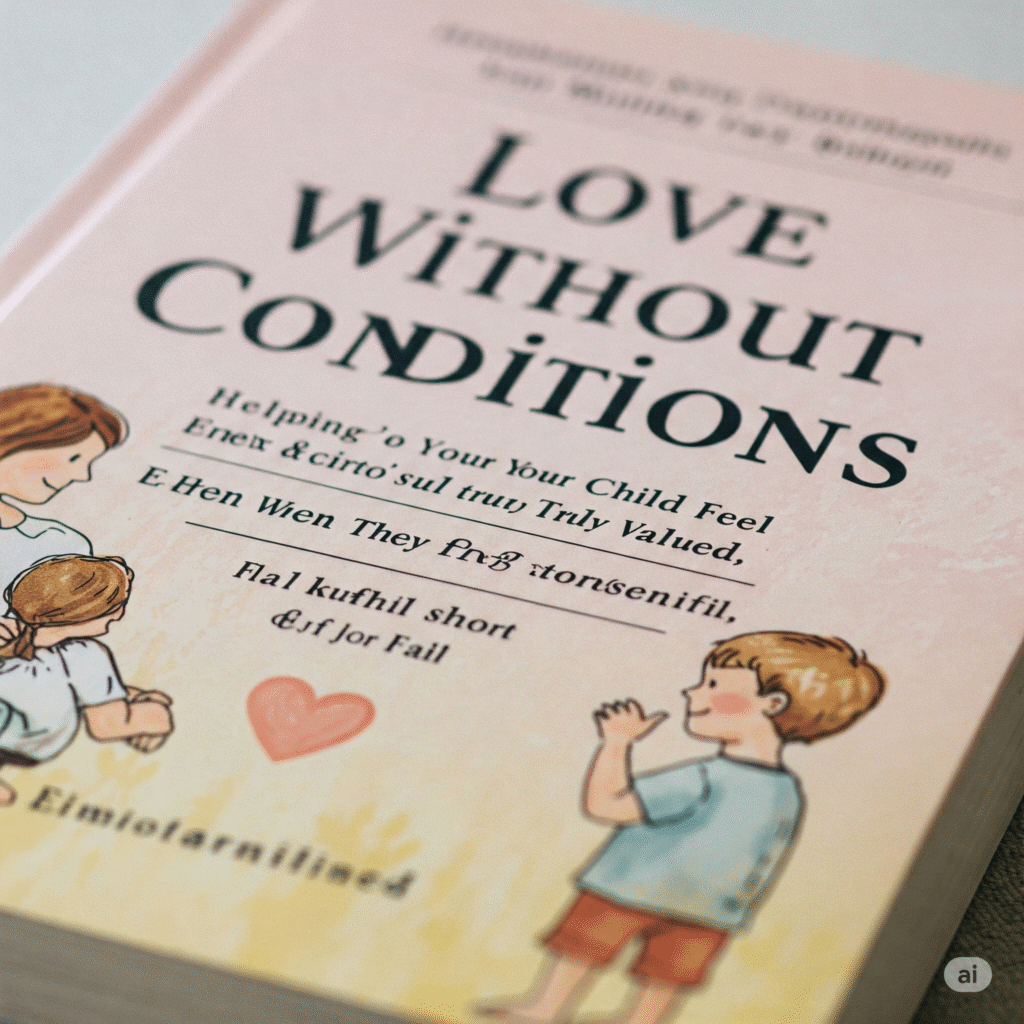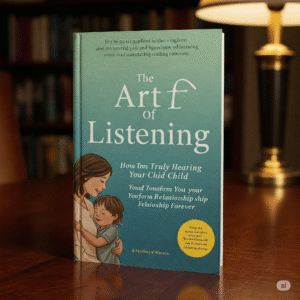Raising Confident Kids: The Power of Unconditional Love

Children don’t need perfect performances—they need unconditional love. This article explores how to love beyond expectations and raise emotionally secure, confident, and connected children.
Love Without Conditions: Helping Your Child Feel Truly Valued, Even When They Fall Short or Fail
CHARACTER LEARNING – I’ll never forget the day my daughter came home, tears clinging to her lashes. She had studied hard for a test but didn’t do well. Her voice trembled as she asked, “Are you mad at me?” That simple question pierced my heart.
Why would she think a bad grade could affect how I feel about her?
That moment taught me something humbling: our children often believe our love is tied to how well they perform. Whether it’s academics, behavior, or achievement in sports or the arts, they quietly wonder—am I still enough when I’m not impressive?
This isn’t because we don’t love them. It’s because we sometimes condition our expressions of love on the moments they meet our expectations.
And most of the time, we don’t even realize we’re doing it.
What Conditional Love Looks Like
Conditional love doesn’t mean you don’t care. In fact, it often comes from wanting the best for our children. But it can show up in subtle, everyday ways:
- Praising them only when they succeed
- Showing disappointment when they fail, even if it’s unintentional
- Comparing them to siblings or peers
- Withdrawing warmth or attention during conflicts
- Pushing them to “do better” without first affirming who they already are
These patterns may seem harmless, but over time, they teach kids that love is earned—not given freely.
And that’s a dangerous message.
Because when a child believes their worth depends on being “good enough,” they stop taking emotional risks. They stop being honest about their struggles. They learn to hide—behind achievements, perfectionism, or silence.
The Power of Unconditional Love
Unconditional love doesn’t mean we don’t set boundaries or encourage growth. It means we separate who our child is from what they do.
It’s saying:
“You don’t have to be perfect to be loved.”
“Even when you mess up, I’m still here.”
“My love isn’t a reward. It’s your home.”
When a child feels this kind of love, something powerful happens—they begin to internalize self-worth. They learn that they are valuable not because of their grades, trophies, or good behavior, but because they exist. They begin to feel safe, secure, and emotionally resilient.
This doesn’t make them lazy or entitled. In fact, children who feel unconditionally loved are often more willing to take responsibility for mistakes—because they’re not afraid that failing means losing affection.
Why This Is Hard for Many Parents
Let’s be honest: many of us were not raised with this kind of love.
We may have grown up believing love had to be earned—through obedience, excellence, or keeping the peace. And now, as adults, we carry those messages into our own parenting, often unconsciously.
We fear that if we’re too soft, our children will grow up undisciplined. Or if we don’t “correct” their shortcomings, we’re failing as parents. But here’s the truth:
Firmness without love creates fear.
Love without conditions creates strength.
You can set high expectations and make your child feel deeply loved. These two things are not opposites—they are partners.
How to Practice Unconditional Love (Even in Hard Moments)
1. Affirm Their Worth When They Fail
After a loss, a mistake, or a moment of poor judgment, resist the urge to lecture first. Instead, start with:
“I know this didn’t go the way you wanted. I’m proud of how you tried.”
“This doesn’t change how much I love you.”
The goal is to remind them: Your failure is not your identity.
2. Praise Effort, Not Just Outcomes
Instead of only saying “Good job on the A+,” say:
“I saw how much time you put into studying. That matters more than the grade.”
This shifts their sense of worth from results to character and effort.
3. Be Emotionally Available During Disappointments
Often, we pull away when we’re upset or when our child disappoints us. But in those very moments, they need closeness most. Physical affection, calm presence, and gentle words can be healing.
4. Avoid Shame-Based Language
Phrases like “What’s wrong with you?” or “You always mess things up” damage self-worth. Instead, address behavior without attacking identity. Say:
“That choice wasn’t okay, but I know you can make a better one next time.”
5. Tell Them You Love Them—Without a “But”
Say it randomly. Say it after mistakes. Say it during ordinary moments. Say:
“I love you, always.”
Not:
“I love you, but you really disappointed me.”
Let love stand alone.
Teaching Children They Are Enough
There’s a quiet crisis in today’s youth—many children don’t feel they’re “enough.” They are anxious, perfectionistic, and afraid of failure. And while many factors contribute to this, one powerful antidote is unconditional love.
By loving your child through failure, you teach them courage.
By staying close during hard moments, you teach them resilience.
By affirming their worth, you teach them to believe in themselves—even when the world doesn’t.
A Personal Reflection
I often remind myself: I am not raising a project—I am raising a person.
My job is not to mold a flawless performer, but to nurture a whole human being. Someone who knows, deep down, “I am worthy of love—not because of what I do, but because of who I am.”
Some days, I get it wrong. I let frustration speak louder than compassion. I react instead of reflect. But then I remember—it’s never too late to reconnect. Never too late to remind my child: Nothing you do can make me love you less.
And isn’t that what we all needed to hear when we were young?
Final Thought
Parenting is not about perfection. It’s about presence. It’s about showing up again and again—with love that doesn’t flinch at failure or fade with imperfection.
Your child may not always remember what you said. But they will always remember how it felt to be loved by you.
Make sure what they remember is this:
“I was enough. Even when I fell short. Even when I failed. I was always enough.”[*]

